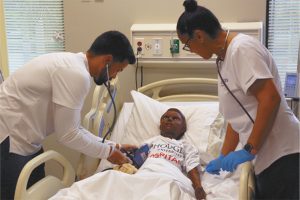By Melissa Bagby, MSN-Ed, BSN, RN, CPN, PED-BC
 One minute a patient is talking to you, and the next, they’re experiencing a medical emergency. That’s where training and experience takes over and allows the nurse to promptly and accurately assess the patient and begin life-saving interventions. It begins with education and training, but how do you prepare nursing students for a variety of medical scenarios?
One minute a patient is talking to you, and the next, they’re experiencing a medical emergency. That’s where training and experience takes over and allows the nurse to promptly and accurately assess the patient and begin life-saving interventions. It begins with education and training, but how do you prepare nursing students for a variety of medical scenarios?
At Hodges University’s Thelma T. Hodges accelerated BSN Program, our students are more than prepared to care for patients thanks to a high-tech group of “patients” that help them apply what they learn to lifelike patient scenarios.. “Hal” “Tory” and “Susie,” for example, have the ability to suddenly suffer from a wide variety of ailments, which gives our students the opportunity to practice what they learn in the classroom.
“Tory” is a life-like high-fidelity newborn that weighs just over eight pounds. She can breathe, cry, grunt, open and close her mouth, blink her eyes and move her arms and legs. “Tory’s“ skin feels like a real newborn and her skin tone can change to become pale, jaundice or cyanotic. Our students can listen to her heartbeat, lung and abdominal sounds, feel her pulse and fontanels, and assess her muscle tone. She can also suffer seizures if that is part of the simulation scenario. Students can also practice starting IVs on the newborn, perform CPR, and ECG monitoring. “Tory” helps prepare students going into a newborn, pediatric, or community setting.
“Hal” is a pediatric patient that can simulate lifelike emotions and phrases. Pediatric “Hal’s” emotions, include anger, worry, anxiousness, crying, yawning and being quizzical and amazed. This helps our students learn how to communicate with young patients in a variety of settings. For example, if “Hal” is lethargic, his eyelids will droop and his head movements slow, and he may yawn. When he cries, he sheds real tears to further enhance the student learning process related to pediatric patients and communication. Hodges University BSN students can practice multiple skills to assess “Hal’s” condition, including trauma, neurological diseases, and respiratory distress. His eyes will track when students enter the room and his pupils can dilate and constrict when a penlight is shined on them.. Our students can also listen to his heart, lung and bowel sounds, and detect any abnormal respiratory patterns. Students can also practice using airway support devices and hemothorax procedures. Any situation a nurse may encounter with a pediatric patient can be simulated in the HU high-fidelity simulation hospital.
Several adult “Susie” mid-fidelity simulators provide our students the opportunity to learn and practice their clinical skills. Some of the skills taught in the Hodges University nursing skills lab include obtaining vital signs and listening to heart, lung and bowel sounds. Students can also practicetracheostomycare, nasogastric tube insertion, feeding and care, patient catherterization, correct placement of ECG electrodes, and CPR. “Susie” can also suffer from medical conditions that include a heart attack, heart failure, acute respiratory distress, asthma, chronic obstructive pulmonary disorder, fluid and electrolyte imbalance, hypoglycemia, new onset diabetes, pneumonia and sepsis.
Adult “Hal” gives our students the opportunity to practice connecting monitoring devices for EKGs, defibrillators, oximeters, capnographs and NIBP monitors. Hodges University students can practice various skills, including nasal/oral intubation, surgical airway, feeling carotid, femoral, popliteal, brachial and pedal pulses, listening to airway, bowel and heart sounds, and visualizing tongue edema, pharyngeal swelling, and more. Students can also practice IV insertion and monitoring, intramuscular access, catheterization, and needle decompression. “Hal” can simulate most patient scenarios students may encounter as nurses.
The patients in the Hodges University skills and simulation labs provide our students with invaluable clinical practice that translates to their clinical experiences while caring for real patients in our community. The advanced technology provides students with knowledge, skills, and confidence required to help real patients.
Melissa Bagby, MSN-Ed, BSN, RN, CPN, PED-BC, is the Interim Director of the nursing program at Hodges University.
239-482-0019 | Hodges.edu









